State of elections since 2020
Comments
-
Show mez yourz paperz!09/15/1998 & 09/16/1998, Mansfield, MA; 08/29/00 08/30/00, Mansfield, MA; 07/02/03, 07/03/03, Mansfield, MA; 09/28/04, 09/29/04, Boston, MA; 09/22/05, Halifax, NS; 05/24/06, 05/25/06, Boston, MA; 07/22/06, 07/23/06, Gorge, WA; 06/27/2008, Hartford; 06/28/08, 06/30/08, Mansfield; 08/18/2009, O2, London, UK; 10/30/09, 10/31/09, Philadelphia, PA; 05/15/10, Hartford, CT; 05/17/10, Boston, MA; 05/20/10, 05/21/10, NY, NY; 06/22/10, Dublin, IRE; 06/23/10, Northern Ireland; 09/03/11, 09/04/11, Alpine Valley, WI; 09/11/11, 09/12/11, Toronto, Ont; 09/14/11, Ottawa, Ont; 09/15/11, Hamilton, Ont; 07/02/2012, Prague, Czech Republic; 07/04/2012 & 07/05/2012, Berlin, Germany; 07/07/2012, Stockholm, Sweden; 09/30/2012, Missoula, MT; 07/16/2013, London, Ont; 07/19/2013, Chicago, IL; 10/15/2013 & 10/16/2013, Worcester, MA; 10/21/2013 & 10/22/2013, Philadelphia, PA; 10/25/2013, Hartford, CT; 11/29/2013, Portland, OR; 11/30/2013, Spokane, WA; 12/04/2013, Vancouver, BC; 12/06/2013, Seattle, WA; 10/03/2014, St. Louis. MO; 10/22/2014, Denver, CO; 10/26/2015, New York, NY; 04/23/2016, New Orleans, LA; 04/28/2016 & 04/29/2016, Philadelphia, PA; 05/01/2016 & 05/02/2016, New York, NY; 05/08/2016, Ottawa, Ont.; 05/10/2016 & 05/12/2016, Toronto, Ont.; 08/05/2016 & 08/07/2016, Boston, MA; 08/20/2016 & 08/22/2016, Chicago, IL; 07/01/2018, Prague, Czech Republic; 07/03/2018, Krakow, Poland; 07/05/2018, Berlin, Germany; 09/02/2018 & 09/04/2018, Boston, MA; 09/08/2022, Toronto, Ont; 09/11/2022, New York, NY; 09/14/2022, Camden, NJ; 09/02/2023, St. Paul, MN; 05/04/2024 & 05/06/2024, Vancouver, BC; 05/10/2024, Portland, OR; 05/03/2025, New Orleans, LA;
Libtardaplorable©. And proud of it.
Brilliantati©0 -
Your papers…. do not appear to be in orderHalifax2TheMax said:Show mez yourz paperz!0 -
I expect to be detained at some point. Maybe even get a bumpy ride to El Salvador.mrussel1 said:
Your papers…. do not appear to be in orderHalifax2TheMax said:Show mez yourz paperz!09/15/1998 & 09/16/1998, Mansfield, MA; 08/29/00 08/30/00, Mansfield, MA; 07/02/03, 07/03/03, Mansfield, MA; 09/28/04, 09/29/04, Boston, MA; 09/22/05, Halifax, NS; 05/24/06, 05/25/06, Boston, MA; 07/22/06, 07/23/06, Gorge, WA; 06/27/2008, Hartford; 06/28/08, 06/30/08, Mansfield; 08/18/2009, O2, London, UK; 10/30/09, 10/31/09, Philadelphia, PA; 05/15/10, Hartford, CT; 05/17/10, Boston, MA; 05/20/10, 05/21/10, NY, NY; 06/22/10, Dublin, IRE; 06/23/10, Northern Ireland; 09/03/11, 09/04/11, Alpine Valley, WI; 09/11/11, 09/12/11, Toronto, Ont; 09/14/11, Ottawa, Ont; 09/15/11, Hamilton, Ont; 07/02/2012, Prague, Czech Republic; 07/04/2012 & 07/05/2012, Berlin, Germany; 07/07/2012, Stockholm, Sweden; 09/30/2012, Missoula, MT; 07/16/2013, London, Ont; 07/19/2013, Chicago, IL; 10/15/2013 & 10/16/2013, Worcester, MA; 10/21/2013 & 10/22/2013, Philadelphia, PA; 10/25/2013, Hartford, CT; 11/29/2013, Portland, OR; 11/30/2013, Spokane, WA; 12/04/2013, Vancouver, BC; 12/06/2013, Seattle, WA; 10/03/2014, St. Louis. MO; 10/22/2014, Denver, CO; 10/26/2015, New York, NY; 04/23/2016, New Orleans, LA; 04/28/2016 & 04/29/2016, Philadelphia, PA; 05/01/2016 & 05/02/2016, New York, NY; 05/08/2016, Ottawa, Ont.; 05/10/2016 & 05/12/2016, Toronto, Ont.; 08/05/2016 & 08/07/2016, Boston, MA; 08/20/2016 & 08/22/2016, Chicago, IL; 07/01/2018, Prague, Czech Republic; 07/03/2018, Krakow, Poland; 07/05/2018, Berlin, Germany; 09/02/2018 & 09/04/2018, Boston, MA; 09/08/2022, Toronto, Ont; 09/11/2022, New York, NY; 09/14/2022, Camden, NJ; 09/02/2023, St. Paul, MN; 05/04/2024 & 05/06/2024, Vancouver, BC; 05/10/2024, Portland, OR; 05/03/2025, New Orleans, LA;
Libtardaplorable©. And proud of it.
Brilliantati©0 -
Republicans are praising President Trump's executive order that bypasses Congress to change election laws and restrict ballot access.
The GOP had a completely different reaction to President Biden's 2021 order expanding voter registration. https://www.democracydocket.com/analysis/gop-slammed-bidens-voting-order-as-federal-overreach-but-praised-trumps/_____________________________________SIGNATURE________________________________________________
Not today Sir, Probably not tomorrow.............................................. bayfront arena st. pete '94
you're finally here and I'm a mess................................................... nationwide arena columbus '10
memories like fingerprints are slowly raising.................................... first niagara center buffalo '13
another man ..... moved by sleight of hand...................................... joe louis arena detroit '140 -
Nonprofits known as 527s can raise unlimited sums for political spending. Our database allows you to more easily search these organizations' finances.
We've just updated it with 140,000 new records. Check it out: https://propub.li/44knZBP_____________________________________SIGNATURE________________________________________________
Not today Sir, Probably not tomorrow.............................................. bayfront arena st. pete '94
you're finally here and I'm a mess................................................... nationwide arena columbus '10
memories like fingerprints are slowly raising.................................... first niagara center buffalo '13
another man ..... moved by sleight of hand...................................... joe louis arena detroit '140 -
NEW: President Donald Trump directs the DOJ "to take all necessary action to help secure the release" of Tina Peters, calling her a "hostage." The former GOP elections clerk serving a nine-year sentence in Colorado for tampering with voting systems._____________________________________SIGNATURE________________________________________________
Not today Sir, Probably not tomorrow.............................................. bayfront arena st. pete '94
you're finally here and I'm a mess................................................... nationwide arena columbus '10
memories like fingerprints are slowly raising.................................... first niagara center buffalo '13
another man ..... moved by sleight of hand...................................... joe louis arena detroit '140 -
The prick loves law breakers that commit crimes for him!mickeyrat said:NEW: President Donald Trump directs the DOJ "to take all necessary action to help secure the release" of Tina Peters, calling her a "hostage." The former GOP elections clerk serving a nine-year sentence in Colorado for tampering with voting systems.jesus greets me looks just like me ....0 -
Fairly certain she was convicted under state law. He has no authority.josevolution said:
The prick loves law breakers that commit crimes for him!mickeyrat said:NEW: President Donald Trump directs the DOJ "to take all necessary action to help secure the release" of Tina Peters, calling her a "hostage." The former GOP elections clerk serving a nine-year sentence in Colorado for tampering with voting systems.0 -
mrussel1 said:
Fairly certain she was convicted under state law. He has no authority.josevolution said:
The prick loves law breakers that commit crimes for him!mickeyrat said:NEW: President Donald Trump directs the DOJ "to take all necessary action to help secure the release" of Tina Peters, calling her a "hostage." The former GOP elections clerk serving a nine-year sentence in Colorado for tampering with voting systems.carrot and stick leading with the stick.he'll claim the authority...._____________________________________SIGNATURE________________________________________________
Not today Sir, Probably not tomorrow.............................................. bayfront arena st. pete '94
you're finally here and I'm a mess................................................... nationwide arena columbus '10
memories like fingerprints are slowly raising.................................... first niagara center buffalo '13
another man ..... moved by sleight of hand...................................... joe louis arena detroit '140 -
He'll try, but I don't think it will work. The courts rule consistently against gov't coercion. The ruling on Friday regarding Perkins-Coi is another example of an EO that violated multiple amendments.mickeyrat said:mrussel1 said:
Fairly certain she was convicted under state law. He has no authority.josevolution said:
The prick loves law breakers that commit crimes for him!mickeyrat said:NEW: President Donald Trump directs the DOJ "to take all necessary action to help secure the release" of Tina Peters, calling her a "hostage." The former GOP elections clerk serving a nine-year sentence in Colorado for tampering with voting systems.carrot and stick leading with the stick.he'll claim the authority....0 -
_____________________________________SIGNATURE________________________________________________
Not today Sir, Probably not tomorrow.............................................. bayfront arena st. pete '94
you're finally here and I'm a mess................................................... nationwide arena columbus '10
memories like fingerprints are slowly raising.................................... first niagara center buffalo '13
another man ..... moved by sleight of hand...................................... joe louis arena detroit '140 -
_____________________________________SIGNATURE________________________________________________
Not today Sir, Probably not tomorrow.............................................. bayfront arena st. pete '94
you're finally here and I'm a mess................................................... nationwide arena columbus '10
memories like fingerprints are slowly raising.................................... first niagara center buffalo '13
another man ..... moved by sleight of hand...................................... joe louis arena detroit '140 -
Despite grand claims, a new report shows noncitizen voting hasn't materialized_____________________________________SIGNATURE________________________________________________
Not today Sir, Probably not tomorrow.............................................. bayfront arena st. pete '94
you're finally here and I'm a mess................................................... nationwide arena columbus '10
memories like fingerprints are slowly raising.................................... first niagara center buffalo '13
another man ..... moved by sleight of hand...................................... joe louis arena detroit '140 -
 https://www.foxnews.com/politics/voter-id-law-texas-wins-appeals-court-after-biden-admin-sued
https://www.foxnews.com/politics/voter-id-law-texas-wins-appeals-court-after-biden-admin-sued"'The ID number requirement is obviously designed to confirm that each mail-in ballot voter is precisely who he claims he is,' Judge James Ho writes"
0 -
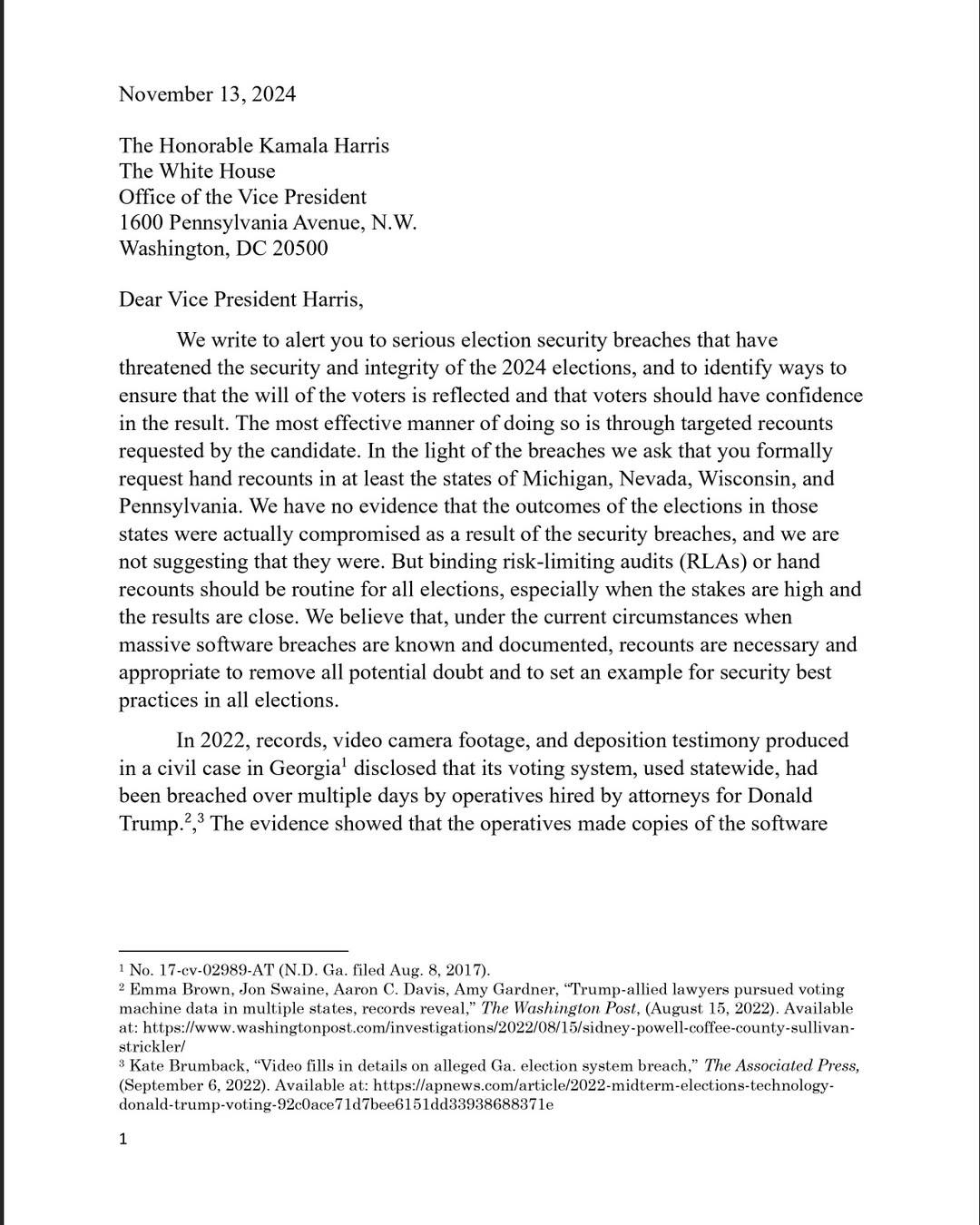
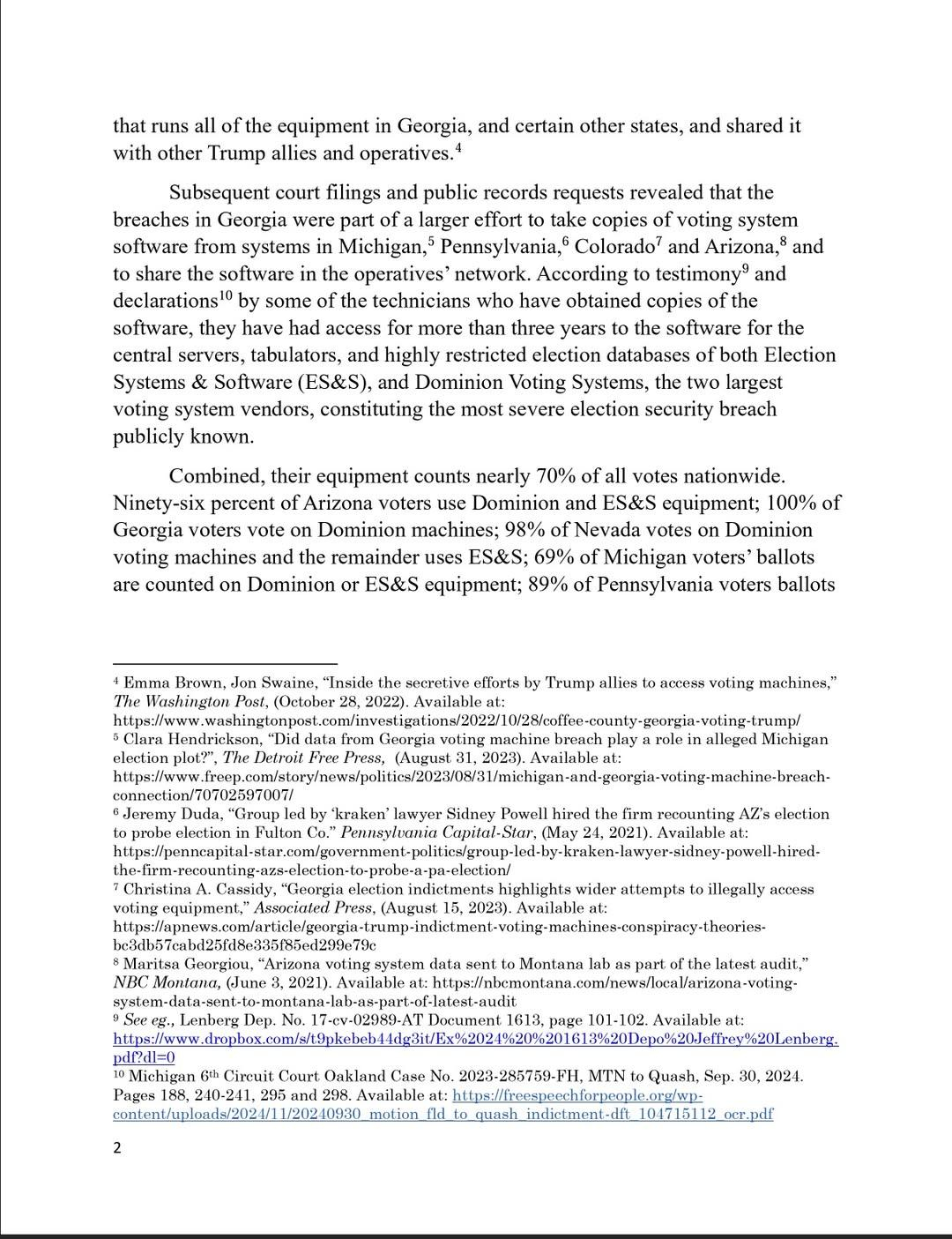
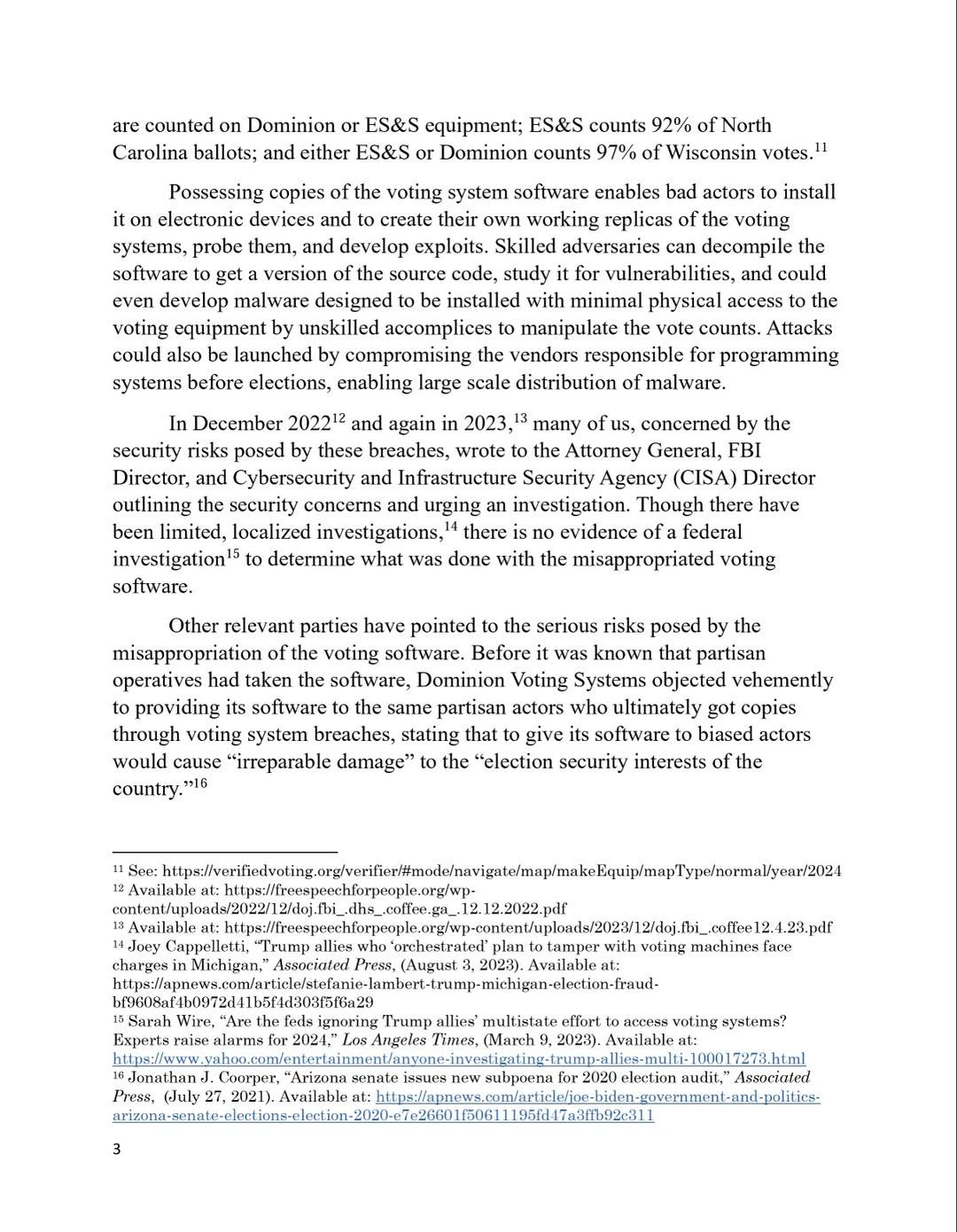
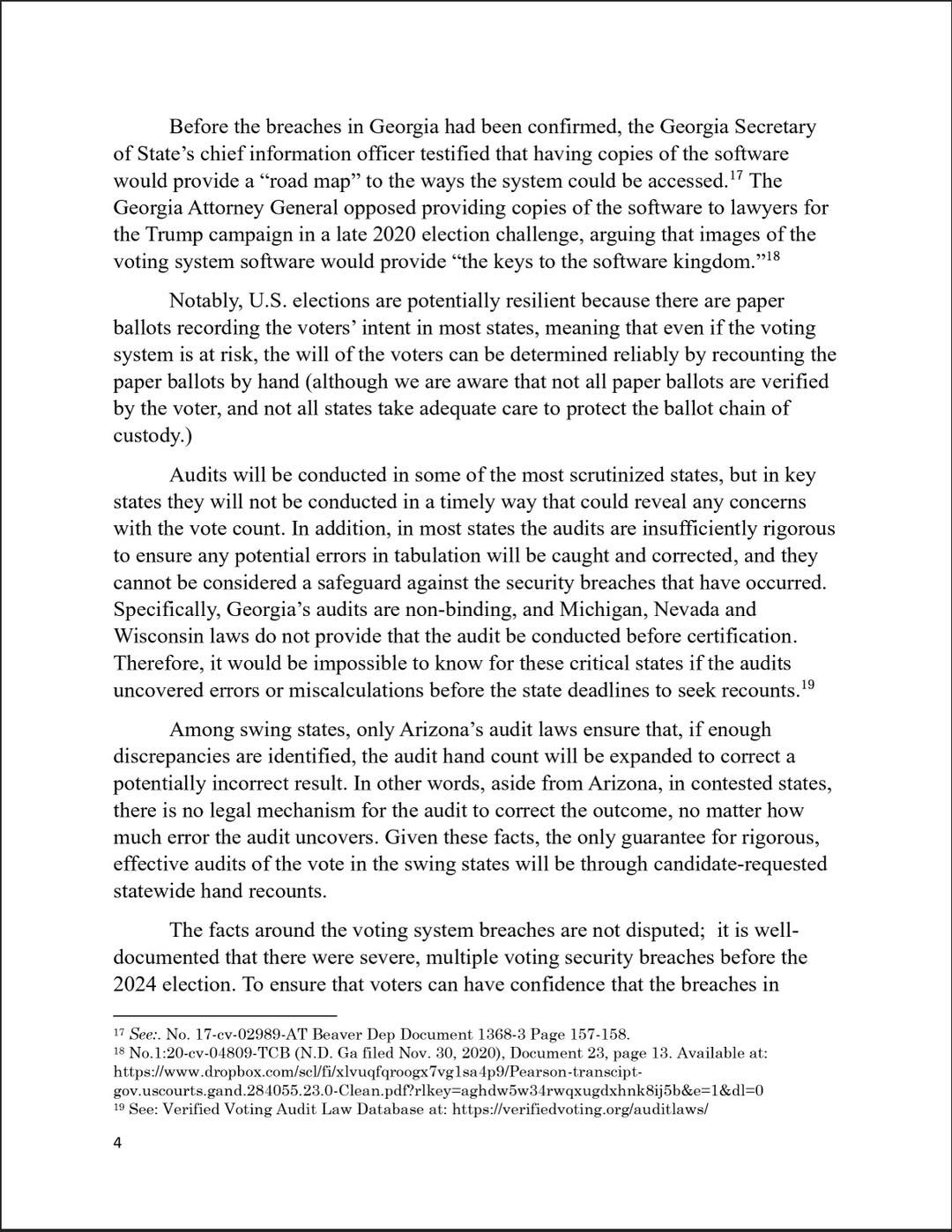
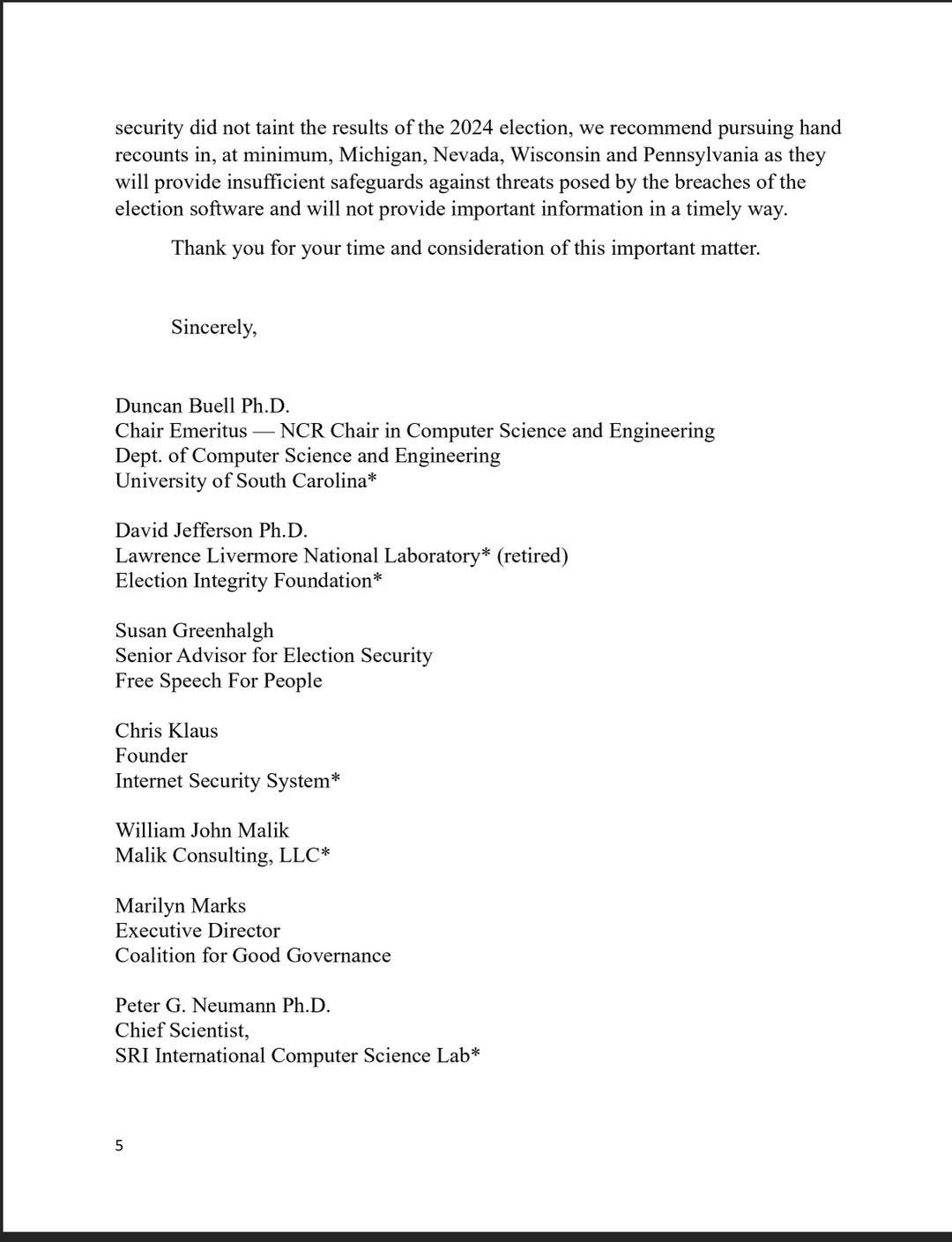
_____________________________________SIGNATURE________________________________________________
Not today Sir, Probably not tomorrow.............................................. bayfront arena st. pete '94
you're finally here and I'm a mess................................................... nationwide arena columbus '10
memories like fingerprints are slowly raising.................................... first niagara center buffalo '13
another man ..... moved by sleight of hand...................................... joe louis arena detroit '140 -
What, if any, did Kamala and the DNC do to follow up on this matter and what, if anything, is going on now? I believe I’ve seen reporting that there are lawsuits and independent investigations be conducted but stonewalled.mickeyrat said:




Like I’ve said and I’ll say it again, it’s too late.09/15/1998 & 09/16/1998, Mansfield, MA; 08/29/00 08/30/00, Mansfield, MA; 07/02/03, 07/03/03, Mansfield, MA; 09/28/04, 09/29/04, Boston, MA; 09/22/05, Halifax, NS; 05/24/06, 05/25/06, Boston, MA; 07/22/06, 07/23/06, Gorge, WA; 06/27/2008, Hartford; 06/28/08, 06/30/08, Mansfield; 08/18/2009, O2, London, UK; 10/30/09, 10/31/09, Philadelphia, PA; 05/15/10, Hartford, CT; 05/17/10, Boston, MA; 05/20/10, 05/21/10, NY, NY; 06/22/10, Dublin, IRE; 06/23/10, Northern Ireland; 09/03/11, 09/04/11, Alpine Valley, WI; 09/11/11, 09/12/11, Toronto, Ont; 09/14/11, Ottawa, Ont; 09/15/11, Hamilton, Ont; 07/02/2012, Prague, Czech Republic; 07/04/2012 & 07/05/2012, Berlin, Germany; 07/07/2012, Stockholm, Sweden; 09/30/2012, Missoula, MT; 07/16/2013, London, Ont; 07/19/2013, Chicago, IL; 10/15/2013 & 10/16/2013, Worcester, MA; 10/21/2013 & 10/22/2013, Philadelphia, PA; 10/25/2013, Hartford, CT; 11/29/2013, Portland, OR; 11/30/2013, Spokane, WA; 12/04/2013, Vancouver, BC; 12/06/2013, Seattle, WA; 10/03/2014, St. Louis. MO; 10/22/2014, Denver, CO; 10/26/2015, New York, NY; 04/23/2016, New Orleans, LA; 04/28/2016 & 04/29/2016, Philadelphia, PA; 05/01/2016 & 05/02/2016, New York, NY; 05/08/2016, Ottawa, Ont.; 05/10/2016 & 05/12/2016, Toronto, Ont.; 08/05/2016 & 08/07/2016, Boston, MA; 08/20/2016 & 08/22/2016, Chicago, IL; 07/01/2018, Prague, Czech Republic; 07/03/2018, Krakow, Poland; 07/05/2018, Berlin, Germany; 09/02/2018 & 09/04/2018, Boston, MA; 09/08/2022, Toronto, Ont; 09/11/2022, New York, NY; 09/14/2022, Camden, NJ; 09/02/2023, St. Paul, MN; 05/04/2024 & 05/06/2024, Vancouver, BC; 05/10/2024, Portland, OR; 05/03/2025, New Orleans, LA;
Libtardaplorable©. And proud of it.
Brilliantati©0 -
Post edited by mickeyrat on_____________________________________SIGNATURE________________________________________________
Not today Sir, Probably not tomorrow.............................................. bayfront arena st. pete '94
you're finally here and I'm a mess................................................... nationwide arena columbus '10
memories like fingerprints are slowly raising.................................... first niagara center buffalo '13
another man ..... moved by sleight of hand...................................... joe louis arena detroit '140 -
Americans worry democracy in danger amid redistricting fights, Reuters/Ipsos poll finds - https://www.reuters.com/world/us/americans-worry-democracy-danger-amid-gerrymandering-fights-reutersipsos-poll-2025-08-21/_____________________________________SIGNATURE________________________________________________
Not today Sir, Probably not tomorrow.............................................. bayfront arena st. pete '94
you're finally here and I'm a mess................................................... nationwide arena columbus '10
memories like fingerprints are slowly raising.................................... first niagara center buffalo '13
another man ..... moved by sleight of hand...................................... joe louis arena detroit '140 -
Well we can at least say we voted in the last democratic held elections!jesus greets me looks just like me ....0
-
Categories
- All Categories
- 149.2K Pearl Jam's Music and Activism
- 110.3K The Porch
- 287 Vitalogy
- 35.1K Given To Fly (live)
- 3.5K Words and Music...Communication
- 39.4K Flea Market
- 39.4K Lost Dogs
- 58.7K Not Pearl Jam's Music
- 10.6K Musicians and Gearheads
- 29.1K Other Music
- 17.8K Poetry, Prose, Music & Art
- 1.1K The Art Wall
- 56.8K Non-Pearl Jam Discussion
- 22.2K A Moving Train
- 31.7K All Encompassing Trip
- 2.9K Technical Stuff and Help






